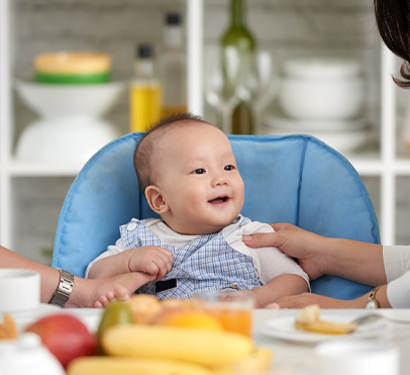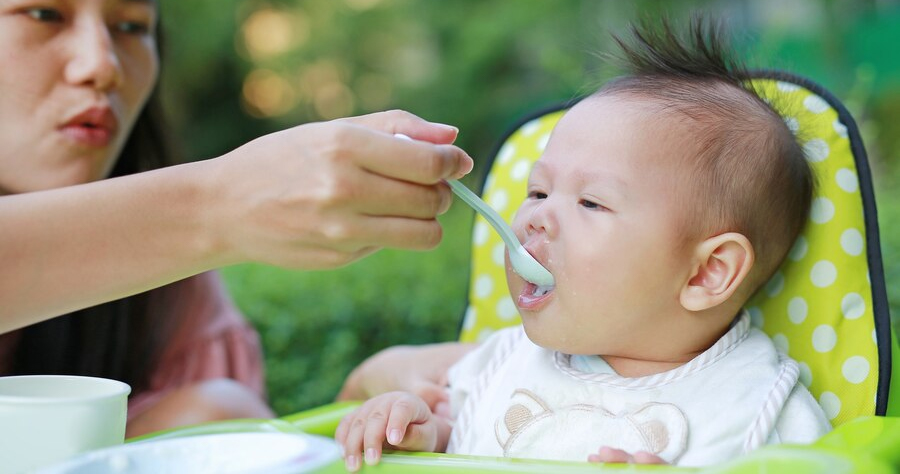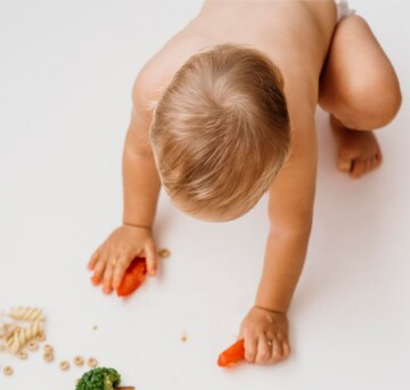Introducing Solid Foods to Your Baby: Everything You Need to Know
29 August 2024

Time passes quickly, and before you know it, your little one is almost 6 months old.
At this stage, milk alone may not be enough to meet their nutritional needs for healthy growth and development. It is now time to take that big step in your baby’s life: transitioning from a milk-only diet to solid foods!
This exciting milestone begins with the gradual introduction of solid food to your baby’s diet while still continuing to feed them breastmilk or formula. This process is known as complementary feeding, or weaning, and is an important part of your baby’s development.
Not sure how to navigate this process? Fear not, we have got you covered. Over here, we have compiled a simple guide to help you get your baby started with solid food through complementary feeding, and to recognise signs that may indicate a food allergy.
How Do You Start Complementary Feeding?
When exactly should a baby start eating solid food? According to World Health Organization (WHO) guidelines, it is recommended to start complementary feeding at the age of 6 months.
To start, try replacing one of your baby’s milk feeding sessions with a complementary meal. You may aim to feed your baby two to three complementary meals in a day.
It is best to introduce one single-ingredient food at a time, starting with just a teaspoonful or two of food and gradually increasing the amount over time. Be sure to wait for 3 to 5 days before introducing another new food to monitor for possible allergic reactions.
We will also cover allergic reactions later in this article, so be sure to read on.
What Kinds of Foods Are Suitable for My Baby?

At 6 months old, appropriate baby food includes thin to thick and smooth purees and mashes. Some great choices for baby’s first solid foods at this stage include infant cereal, strained meat, pureed vegetables and fruits.
Once your baby turns 7 months old, you can introduce complementary foods with soft and lumpy textures, such as mashes with soft lumps, foods that bite and dissolve or soft chews.
From 8 months old onwards, as your baby will begin to start chewing, you can start to give your baby mashes with harder lumpy solids. Most babies at this age are able to chew without gagging by 12 months.
Foods to Avoid Feeding to Your Baby
However, not all foods are safe for your baby to eat. Avoid introducing the following foods before your baby turns one:
- Cow’s milk
- Honey
- Fishes with high mercury content (e.g., grouper, mackerel, sea bass, tuna)
- Partially cooked meats
- Foods with added salt and sugar
- Juices that come from a box
As your baby is at the stage where they are learning to chew and swallow, it is also not advisable to feed them food that can become a choking hazard. To prevent choking in infants, these following foods should be avoided:
- Sausages
- Nuts and seeds
- Chunks of meats or cheese
- Whole grapes
- Popcorn
- Raw vegetables
- Fruit chunks
- Chunks of peanut butter
- Hard, gooey, or sticky candy
- Raisins
Looking Out for Food Allergies
As you navigate this exciting milestone, your baby may occasionally reject food, which is entirely normal. However, sometimes, your baby’s immune system may reject or react to a certain food, which is then known as a food allergy.
Allergies, including atopic conditions such as asthma, eczema, and hay fever, often runs
in families. If you or your partner have known food allergies, your baby has a higher likelihood of developing one as well.
However, whether or not allergies run in your family, it is wise to be cautious when introducing new foods. To monitor for possible allergic reactions in your baby, only give them one single-ingredient food at a time and wait for 3 to 5 days before introducing another new food. Should they develop a reaction, stop feeding that specific food to your baby.

How to Tell If Your Child Has a Food Allergy
Signs and symptoms of a food allergy often appear quickly, showing within minutes or in 1 to 2 hours after the food is eaten.
Acute reactions usually begin soon after eating the food containing the allergen and can vary in severity. They may present in the form of mild to moderate reactions, like hives, stomach cramps or nausea, which may last only for a short time. However, in some cases, they may also progress to life-threatening anaphylaxis, with rapidly spreading hives, tissue swelling, difficulty breathing and/or collapse.
If you suspect your baby has a food allergy, you should consult your baby’s paediatrician. They can diagnose your baby’s specific food allergy by performing skin prick tests or blood tests, which will detect IgE antibodies to specific allergens.
However, not all allergies will persist forever. For some types of food allergies, children will eventually outgrow them.
- Eggs and milk allergy: Most children eventually grow out of these allergies
- Peanut, tree nuts and seafood allergies: These allergies persist into adult life
- Wheat, soy and sesame allergies: Reactions to these tend to be mild and transient
Foods to Avoid According to Allergy Type

Once your paediatrician has diagnosed your baby’s specific allergy, it is crucial that you avoid giving them food that contains the specific allergen.
Here is a list of common foods to avoid based on allergy type:
- Wheat Allergy: Pasta/ yellow noodles, biscuits, sauces including soy sauce, confectionaries, Bread and sausages or processed meats
- Soy Allergy: Edamame, soy desserts, texturised or hydrolysed vegetable protein, soy bean sprouts, soy sauce, tempeh, soy bean sauce or miso paste
- Milk Allergy: Milk, yoghurt, cheese, butter, margarine, baby food, chocolate, creamer custard cream, soups
- Egg Allergy: Eggs, Cakes, ice cream, tartar sauce, bread and biscuits, mayonnaise pasta, egg noodles, sausages pretzels, waffles, pancakes
- Peanut Allergy: Peanuts, carrot cake, nougat, baklava, muesli and muesli bars, hazelnut sauce, Turkish delight, pesto, praline friands, flourless cakes
Starting your baby on solid foods is certainly an exciting milestone. While there may be ups and downs throughout the process, remember to embrace the mess and enjoy the journey of watching your little one discover new flavours and foods as they grow.
If you have concerns about your baby’s developmental milestone, suspect a potential food allergy or have questions about starting your baby on solid food or weaning off breastfeeding, consult our paediatrician for expert advice today: https://www.sunwaymedical.com/en/speciality/paediatrics






